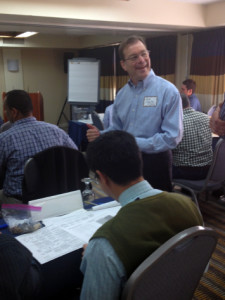Teaching
Teaching and related educational outreach activities have been one of my core capabilities. My teaching style, including presentations at scientific conferences, is enthusiastic and engaging to encompass the typically wide range of learning modalities and technical competencies of the audience.
Creativity, inspiration, and intuition complement training in analytical thought and are widely recognized as being necessary to cutting-edge scientific pursuits.
A common thread in my advisement and mentoring philosophy has been a focus on achieving and sustaining quality in all parts of the academic program. This has included training undergraduate and graduate students in how to prepare, and then consistently deliver, excellent oral, poster, and written presentations at a variety of technical and non-technical forums.
Critical thinking and comprehension, instead of rote memorization, have been fundamental components of my teaching philosophy. The ability to relate theory to observation was stressed in all classes. It was also emphasized that creativity is not random but can be taught and developed. Creativity, inspiration, and intuition complement training in analytical reasoning and are recognized as being useful in scientific pursuits.
IngeoExpert
IngeoExpert is an online training center that delivers specialized courses in Civil Engineering, Geology, Environmental Science, Mining, Architecture and Technical Software. My course “Fracture Mechanics of Rock for Geologists” is available for worldwide distribution since Fall 2023.
TopCorp Training for Oil and Gas Industry Regulators

Conveying the importance of overburden and seal integrity was viewed as critically important by state regulators
During 2016 I participated as a subject matter expert in TopCorp training, sponsored by Colorado School of Mines, UT, and Penn State University, teaching aspects of oil and gas engineering to regulators from the Division of Oil, Gas, and Geothermal Resources (DOGGR; now California Geologic Energy Management Division, CalGEM), State of California. Particular topics included Subsurface Integrity, and Geologic Hazard Identification and Mitigation, and Structural Traps. Four groups totaling about 120 regulators participated in the training workshops. The material and interactive group activities on subsurface risking were of particular value and enjoyment, with the Aliso Canyon, California natural gas blowout fresh in the minds of the regulators, State and national leaders, and the public.
Industry Distance Learning Course on Subsurface Containment Assurance
While with ConocoPhillips and their Subsurface Containment Assurance Team, I co-led the development and deployment of a computer-based training course on this topic. The course cut across traditional institutional silos by emphasizing the relationships between drilling, wells, operations, reservoir engineering, completions, geosciences, and management in identifying and mitigating subsurface fluid losses in oil and gas fields.

The course used an innovative and engaging multimedia format, video clips of company employees from various asset groups, and both regular learning assessments. It was also the first course of its kind at ConocoPhillips designed to be compliant with mobile devices such as iPads. This 50-minute-long eLearning course was taken by many technical employees and managers from many business units, assets, and fields worldwide and led to raising the level of of subsurface containment awareness across the company.
University Courses
Some of the formal undergraduate and graduate classes I have taught at the University of Nevada (with many of these having been taught multiple times) include:
-
GEOL 100 Geology and the Environment (freshman, general science)
-
GEOL 101 Introduction to Physical Geology (freshman)
-
GEOL 101-H General Earth Science for Honors Students (freshman)
-
GE 106 Introduction to Geological Engineering (freshman)
-
GEOL 140 Geology of the Solar System (freshman)
-
GE 250 Geology for Engineers (lower division)
-
GEOL 332 Structure, Tectonics, and Earth Physics I (upper division)
-
GE 480/680 Environmental Geology (upper division and graduate)
-
GE 481/681 Introduction to Geomechanics (upper division and graduate)
-
GE 495/702T Planetary Science (upper division and graduate)
-
GE 744 Mechanics of Joints and Faults (graduate)
-
GE 745 Topics in Advanced Geomechanics (graduate)
-
GE 702T Computational Fracture Mechanics (graduate)
-
GE 701T Advanced Rock Mechanics for Tectonics (graduate)
-
GE 701T Deformation of Sandstone and Porous Geomaterials (graduate)
-
GE 702T Geomechanics Professional Seminar (graduate)
-
GE 702T Topics in Planetary Tectonics (graduate)
